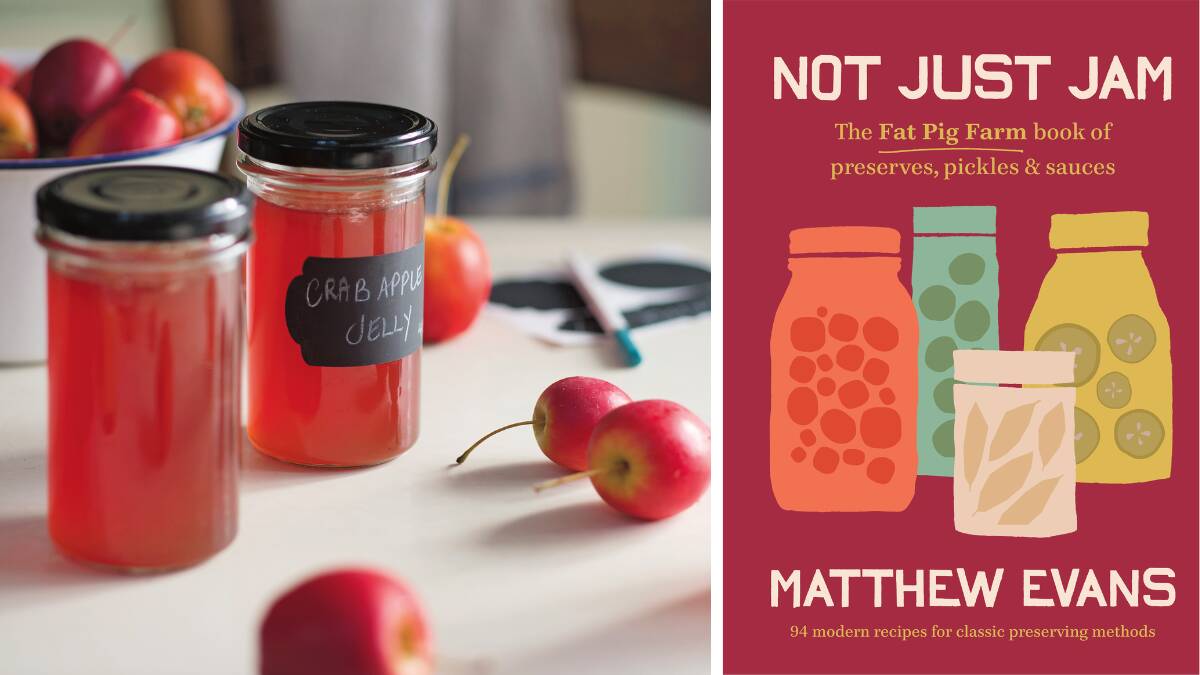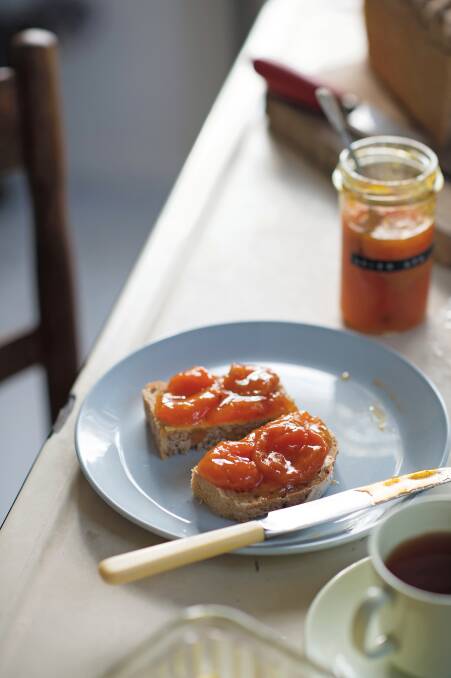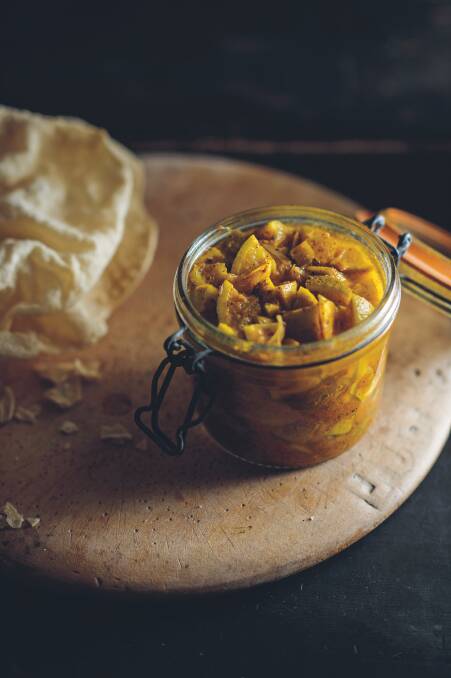This book is Fat Pig Farm's ode to the surplus of the seasons. Overwhelmed by ripe fruit, or mountains of rhubarb, we have found ways to preserve what we grow, and what grows near us.

Not Just Jam is farmer Matthew Evans' collection of more than 90 modern recipes for old-fashioned preserving methods. It is for the forager, who scours the suburbs looking for fruit trees whose bounty is overlooked by others; for the cook who wants their dishes to resonate with flavours borne from their own hands; and for anyone who is passionate about flavour.
- Not Just Jam: The Fat Pig Farm book of preserves, pickles and sauces, by Matthew Evans. Murdoch Books. $39.99.
Dried apricot jam

With a heightened intensity not found in fresh fruit, dried apricots make a wicked jam you can knock up in any season.
Ingredients
- 500g dried apricots (Australian halved apricots are a great option)
- 2 cinnamon sticks
- 1kg sugar
- 2 1/2 tbsp strained lemon juice
Method
1. Wash and sterilise about nine 300ml jars.
2. Put the apricots in a bowl with 1.5 litres of water and soak overnight. Put the apricots and soaking water in a large heavy-based saucepan with the cinnamon sticks. Bring to the boil over medium heat. Reduce the heat to low and simmer gently for 15 minutes or until the apricots are nice and soft, stirring occasionally. Transfer the mixture to a jam pan, if you have one, over medium heat. Add the sugar and lemon juice. Stir frequently until the mixture comes to the boil. Reduce the heat to low so that the jam simmers gently for about 40 minutes, still stirring occasionally. Remove from the heat and check the set. Pour into warmed sterilised jars and seal. Store in a cool, dark place (or in the fridge, once opened) until ready to gobble down on croissants or something equally buttery.
Makes about 2.5kg.
Crabapple and port jelly

This fruit is beautiful to look at, like perfect blushing baby apples. Our favourite tree bursts forth in nearby Huonville and tempts young hands to test out the fruit but sadly, they're not very nice to eat raw. The good news is that there's always a few fruit left out of reach of little people, and a crabapple jelly is one of life's great joys to have in the pantry. Here's Fat Pig's version of the classic.
Ingredients
- 1.5kg crabapples
- 500g sugar
- juice of 1 lemon, strained
- 100ml tawny port
Method
1. Wash and sterilise three 500ml jars or similar.
2. Cut the crabapples in halves or quarters, leaving the peel on and cores in. Put them in a large stainless steel saucepan and cover with water. Cook for about 30 minutes until the fruit turns to a pulp. Pour this mixture into a jelly bag, or a colander lined with two layers of muslin (cheesecloth), and allow to drain until all the juice has been extracted. Leave it overnight if you can. Don't be tempted to squeeze the pulp through, or your jelly will become cloudy.
3. Measure the juice into a preserving pan: you should have one litre.
4. Warm the sugar in a low oven. Add the lemon juice to the pan and bring to boil then add the warm sugar. Reduce the heat and continue stirring until the sugar has dissolved. Increase the heat so that it starts to boil rapidly and leave to simmer for eight to 10 minutes. Add the tawny and stir thoroughly. Check the set and pour into sterilised jars immediately. Store in the pantry for up to a year, and in the fridge once opened.
Makes about 1.5kg.
Indian-style salted lime pickle

When I first met my partner, Sadie, she didn't let on that her family recipe for salted lime pickle was a thing of wonder. It was only after I wooed her for a few months that a small, unassuming jar of pickle was brought from the fridge and delivered with characteristic understatement. In it, I found a perfect accompaniment to curries. And now that the secret is out, Fat Pig Farm is happy to share the recipe with you, too.
Ingredients
- 400g limes
- 1 1/2 tbsp salt
- 1 tsp ground turmeric
- 1/2 tsp cayenne pepper
- 2 tsp ground allspice
- about 2-3 tbsp white vinegar
Method
1. Wash and sterilise several 200-300ml jars.
2. Make this when limes are cheap. Dice the limes, discarding the seeds, into about 1cm pieces, reserving any juice. Carefully pack the flesh into sterile jars. Combine the salt, spices, vinegar and lime juice and pour into the jars over the limes. Seal. Stand the jars in a warm spot, even with a little sunlight, for a week or so. It's important to jiggle the limes often to keep the liquid around them. Once they've softened, store them in the pantry (or a cool, dark spot) for six months before using.
Makes 400g.
Apple butter with leatherwood honey and cinnamon

There are several ways to make this delightful sweet concoction. Some don't use sugar, some actually add butter. This version reduces apple and sugar, then scents it with leatherwood honey. It's a terrific spread for toast but is equally at home in the base of fruit tarts or with pancakes.
Ingredients
- 2kg tart apples, such as golden delicious, cox's orange pippin or similar
- 2 cinnamon sticks
- 1kg brown sugar
- about 3 tbsp leatherwood honey
Method
1. Chop the apples, including the peel and cores. Toss them into a large saucepan and just cover with water. Add the cinnamon sticks and simmer over medium heat until the apples are really soft. Remove the cinnamon sticks and put the apple and any liquid through a food mill. A food processor simply won't work because it crushes the seeds. You could push it through a sieve if you've more patience than me.
2. Put the apple puree into a clean saucepan - ideally a jam pan or similar - with the sugar and put the heat on low. Stir over this low heat until the sugar is dissolved. Reduce heat to a mere murmur, and simmer for about two hours until dark, thick and jammy, stirring often to prevent the apple catching. When it's thick and pasty, add the honey, adding more to taste if you think it needs it. Pour the butter into the sterile jars and seal. You can store this in a cool pantry, but it's best kept in the fridge.
Makes about 1kg.


